The AMD 2nd Gen Ryzen Deep Dive: The 2700X, 2700, 2600X, and 2600 Tested
by Ian Cutress on April 19, 2018 9:00 AM ESTCPU Encoding Tests
One of the interesting elements on modern processors is encoding performance. This includes encryption/decryption, as well as video transcoding from one video format to another. In the encrypt/decrypt scenario, this remains pertinent to on-the-fly encryption of sensitive data - a process by which more modern devices are leaning to for software security. Video transcoding as a tool to adjust the quality, file size and resolution of a video file has boomed in recent years, such as providing the optimum video for devices before consumption, or for game streamers who are wanting to upload the output from their video camera in real-time. As we move into live 3D video, this task will only get more strenuous, and it turns out that the performance of certain algorithms is a function of the input/output of the content.
All of our benchmark results can also be found in our benchmark engine, Bench.
7-Zip 9.2: link
One of the freeware compression tools that offers good scaling performance between processors is 7-Zip. It runs under an open-source licence, is fast, and easy to use tool for power users. We run the benchmark mode via the command line for four loops and take the output score.
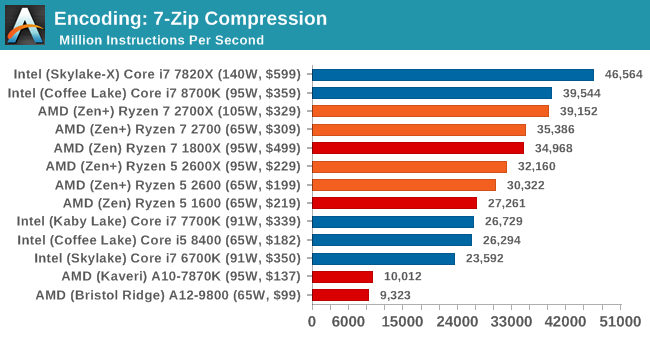
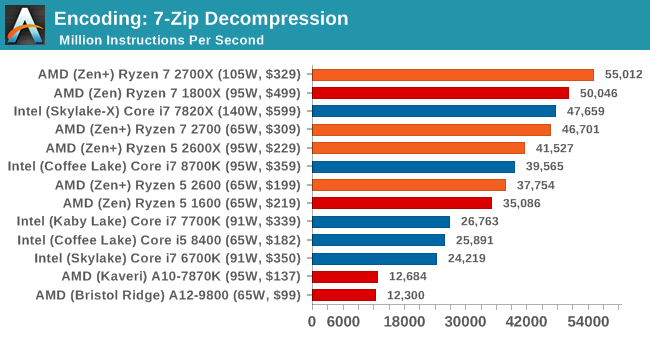
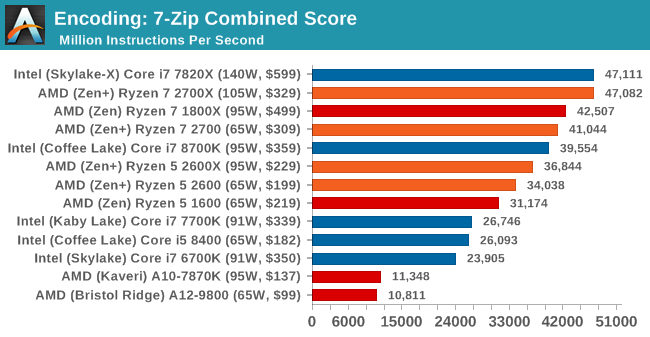
WinRAR 5.40: link
For the 2017 test suite, we move to the latest version of WinRAR in our compression test. WinRAR in some quarters is more user friendly that 7-Zip, hence its inclusion. Rather than use a benchmark mode as we did with 7-Zip, here we take a set of files representative of a generic stack (33 video files in 1.37 GB, 2834 smaller website files in 370 folders in 150 MB) of compressible and incompressible formats. The results shown are the time taken to encode the file. Due to DRAM caching, we run the test 10 times and take the average of the last five runs when the benchmark is in a steady state.
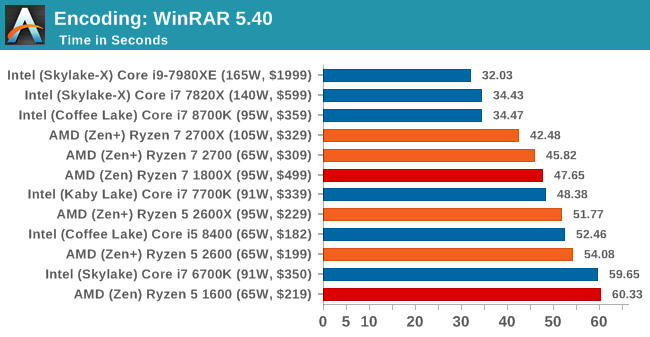
WinRAR requires a good memory base, so we see the quad-channel processors heading up the pack. The high IPC of the Core i7-8700K also does well.
AES Encoding
Algorithms using AES coding have spread far and wide as a ubiquitous tool for encryption. Again, this is another CPU limited test, and modern CPUs have special AES pathways to accelerate their performance. We often see scaling in both frequency and cores with this benchmark. We use the latest version of TrueCrypt and run its benchmark mode over 1GB of in-DRAM data. Results shown are the GB/s average of encryption and decryption.
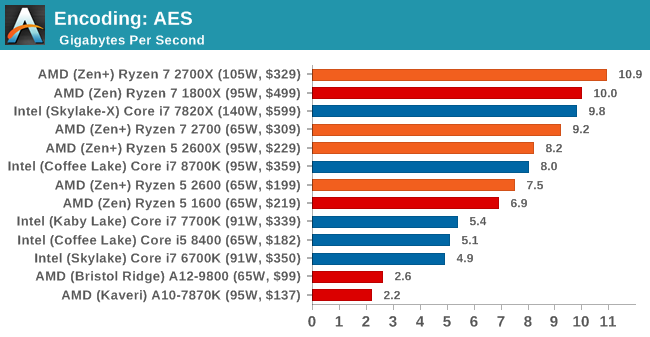
HandBrake v1.0.2 H264 and HEVC: link
As mentioned above, video transcoding (both encode and decode) is a hot topic in performance metrics as more and more content is being created. First consideration is the standard in which the video is encoded, which can be lossless or lossy, trade performance for file-size, trade quality for file-size, or all of the above can increase encoding rates to help accelerate decoding rates. Alongside Google's favorite codec, VP9, there are two others that are taking hold: H264, the older codec, is practically everywhere and is designed to be optimized for 1080p video, and HEVC (or H265) that is aimed to provide the same quality as H264 but at a lower file-size (or better quality for the same size). HEVC is important as 4K is streamed over the air, meaning less bits need to be transferred for the same quality content.
Handbrake is a favored tool for transcoding, and so our test regime takes care of three areas.
Low Quality/Resolution H264: Here we transcode a 640x266 H264 rip of a 2 hour film, and change the encoding from Main profile to High profile, using the very-fast preset.
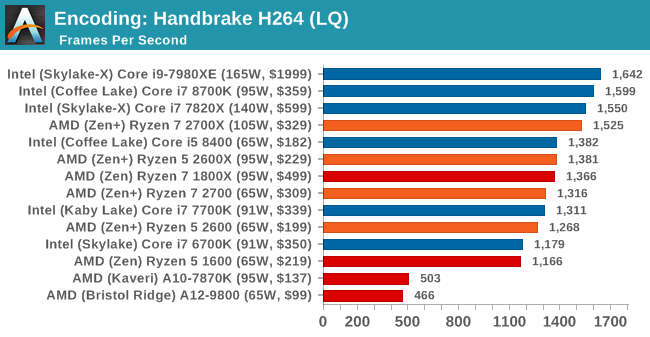
High Quality/Resolution H264: A similar test, but this time we take a ten-minute double 4K (3840x4320) file running at 60 Hz and transcode from Main to High, using the very-fast preset.
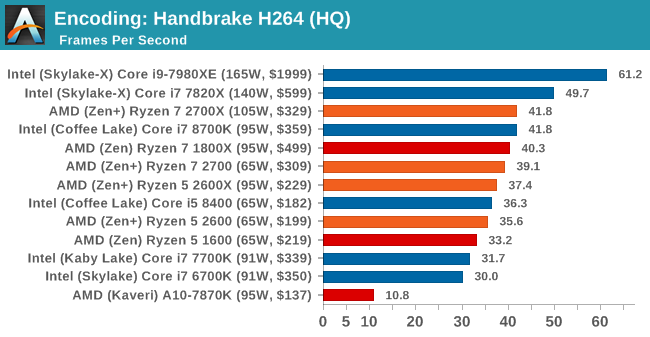
HEVC Test: Using the same video in HQ, we change the resolution and codec of the original video from 4K60 in H264 into 4K60 HEVC.
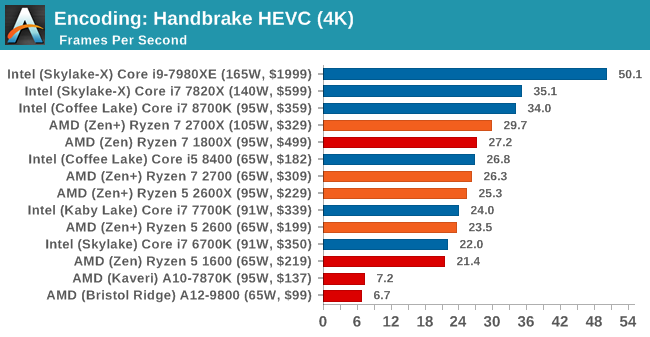
For HandBrake video encoding of large frames, there is a bump with the new Ryzen-2000 series processors over the previous generation, however there is still a gap up to the Core i7-8700K. The Core i5-8400 puts in a good showing here, above all but the best Ryzen parts.










545 Comments
View All Comments
danjw - Friday, April 20, 2018 - link
They Anandtech used the rated speeds that the processors were stated to support by the manufactures. Anandtech, is using everything at stock. Anandtech ran all the processors through fully patched systems (both bios and OS). Not every website other tests to these same methodology. So, there will be differences in their results. None the less, Anandtech, is auditing their results to double check them. I really don't think they are going to see anything wrong. Toms, ran their Intel parts without the latest bios updates. Others overclocked their systems.Most users do not overclock their systems. Sure, a lot of us readers do, but not everyone. I overclock my systems, but, my two brothers who are both just as technical as I am, do not. It is a choice some make and others do not. The majority of users do not overclock. So, Anandtech does not overclock in their most reviews. They have at times in the past and may in the future include overclocking results in reviews, but they have are always broken out the overclocking results in a separate section and/or labeled the overclocked results to differentiate them from the standard clocked results. These are editorial choices that Anandtech makes, I don't see any problem with that.
Luckz - Monday, April 23, 2018 - link
Intel for some reason have 4 memory sticks. Weird idea.werpu - Friday, April 20, 2018 - link
Well the main difference is they tested against fully meltdown and specte patched systems, which in fact is the norm, while all other reviewers simply tested against bare metal. It is known that Intel took a pretty serious hit especially with Meltdown and a more serious hit with Spectre compared to AMD which did not have meltdown at all and to a lesser degree Spectre than Intel did.I would say Anandtechs tests are spot on.
And this reflects the sad state of nowadays performance testing which seems to be done to 99.9% by incompetent idiots or fanboys (especially the youtubers are the worst)
However in extreme situations Intel again wins since the 8700k can be oced by decapping and good cooling to 5GHz while the OC capabilities of the 2700x are basically non existent. It really depends, which is better. But the performance gap is closing and in non OCed system it is not existent anymore. It will be interesting next year when AMD has moved to 7nm while Intel still will be stuck at 10nm which they currently try to pull it but not have yet managed. Then the game might be entirely reversed.
Alphasoldier - Friday, April 20, 2018 - link
Unfortunatelly, you are the only idiot and fanboy here. Pretty much everyone stated in their reviews, the system were fully patched, all cpus were reused and everything was retested, because AMD fanboys were screaming Meltdown here, Spectre there.Now, the internet is full of this garbage review, it spreads like cancer, because AMD fanboys have nothing better to do, once again they are disappointed that 6 cores from Intel outperformed 8 cores from AMD and they are now like the Liverpool fans repeating "The next year will be ours"
But at least they got some fancy RBG cooler.
Fallen Kell - Friday, April 20, 2018 - link
Alphasoldier, I've been reading the reviews, and while many have stated they have applied the software (OS) patches, very few have stated they applied both the software and BIOS patches for the Spectre variant 2. Thew few places that I have seen which have stated both the software and BIOS patches were applied all seem to be showing much more similar results as the AT article.In anycase, Ryan stated they are looking into it, and I am certain we will see an update within the next few days. And don't come saying that I am a AMD fanboi, I havn't purchased a AMD CPU since the Thunderbird (i.e. a slot A CPU).
mapesdhs - Saturday, April 21, 2018 - link
werpu, oc an 8700K to 5GHz? Makes me laugh that a 300MHz bump over a CPU's max single core turbo is even called an oc these days. Sheesh, it's a far cry from the days of SB, oc hardly seems worth bothering with now.mkaibear - Thursday, April 19, 2018 - link
It's here, it's here!Dr. Swag - Thursday, April 19, 2018 - link
What is with the gaming benchmarks? On your tests the whole ryzen 2 series is a step above everything else, but all other reviews show it between ryzen and coffee lake...fallaha56 - Thursday, April 19, 2018 - link
This is the Spectre2 patch effectNot looking great for Intel and HFR gaming
Ryan Smith - Thursday, April 19, 2018 - link
"What is with the gaming benchmarks?"We're looking into it right now. Some of these results weren't in until very recently, so we're going back and doing some additional validation and logging to see if we can get to the bottom of this.